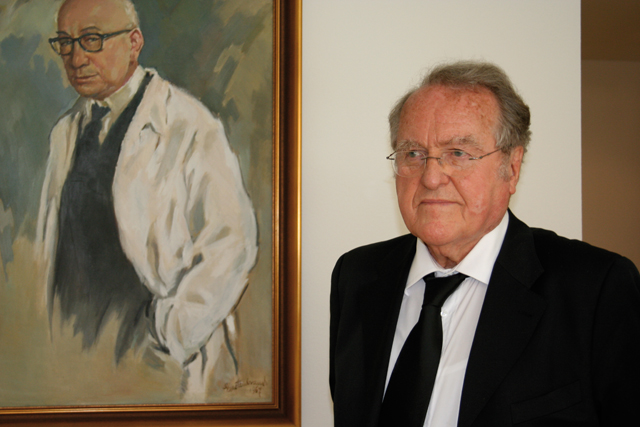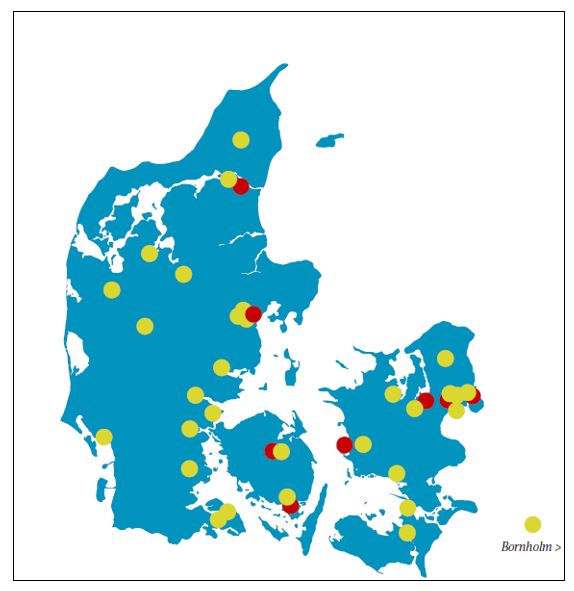 by Franz Gerstenbrand
by Franz Gerstenbrand
After the Second World War there was a collapse in neurology in Europe. The war divided the continent in two parts, in a Western influenced and in a Communistic part. Austria in the middle was a neutral country. The war had damaged the European neurological structures. But the old connections with all the detailed pathways were still present in Central Europe. It was Hans Hoff when he came back from his time in the USA with lots of new ideas who started to revitalize the old neurological connections. A travelling time, at first precautious, started. Prof. Hoff was visiting old friends in Prague, Budapest, Bratislava and Zagreb. Return invitations were following. Travelling actions were extended from Vienna to Poland, Yugoslavia, Italy and Western Germany. It was partly a political decision to contact the Russian neurology. A great positive and sincere resonance was the answer. The foundation of a Central European Group, called “Danube Neurology” followed, hosted in Vienna and with the possibility, for this time nearly incredible, to give the colleagues from West and East the chance of high qualified neurological meetings, exchanging the newest developments in neurology. The Danube organisation was officially supported by the Austrian government and step by step the pharmaceutical industry sponsored the meetings. In the beginning the conferences were held in Vienna, alternatively capitals of neighbour countries like Prague, Bratislava, and Budapest were chosen. The 6th Danube Symposium organised in Moscow was a highlight; colleagues from the whole Soviet Union had their first meeting with Western neurologists.
It was only a question of time for the Central European Neurological Organisation to enlarge its neurological activities to the whole of Europe. It was Prof. Wender from Poland who proposed to include other parts of Europe in the already half official Danube Organisation and to invite colleagues from France and Switzerland at least with the aim to prepare a European congress. Daniel Bartko from Bratislava, then president of the Czechoslovakian Neurological Society and with useful political connections to the officially responsible system had enough courage to risk the organisation of a big congress for the entire European neurology. He held the first Pan-European conference in Prague, based on the experience and the connections of the Danube group. The conference had an excellent result. The whole of Europe came 1989 to Prague. Full of enthusiasm a consortium was founded with the plan to hold the next Pan-European congress in1991 in Vienna. I was appointed to organise this first real European Neurological Congress with an attempt of worldwide participation. From the USA Antonio Culebras came to Vienna. The Scandinavian neurologists Ragnar Stien and Johan Aarli brought a special dynamic in the congress and the post congress activities, being the basis of the building up a European Neurological Organisation. Lord John Walton, the president of the World Federation of Neurology supported this idea.
It was Lord Walton who gave the special format to this new European organisation – the European Federation of Neurological Societies – as a democratic institution, organised as a federation of all acting national European societies, having a parliament in the format of a council of delegates as its responsible political body. Clear democratic rules decided the work of the organisation. This was the great difference to the parallel developing European Neurological Society (ENS). From the beginning of both organisations it was their interest to have a common programme in the different obligations, an idea which was supported by Lord Walton.
In the following times, the EFNS was successful in promoting its three basic obligations. The first main obligation was the organisation of congresses to bring information about the latest research results in neuroscience to all European neurologists. The second main obligation was to organise teaching and training courses in neurology for bringing a high qualified level into the farthest corner of Europe, a tradition which came from the basic ideology of the Danube Group and the third socio-political obligation to bring the brain and its function in a prime position in all health decisions worldwide.
Following the first decisions about the leading positions in EFNS, a well working Management Committee was nominated to define organisational structures. Uschi Tschabitscher and her collaborators worked under the well balanced control of Jes Olesen and myself, like a young family, having built a house with a good financial balance.
The now upcoming new organisation – the European Academy of Neurology – as a unification of ENS, an organisation with great tradition in neurology, and the EFNS with great experience in organising modern neurology, is taking over this heritage with the obligation to follow a common way, including all the ethical principles in neurology and proposing a clinical neurology based on a more or less topical orientated neurology supported by modern techniques. Not to forget the important political duty that this medical specialty is working for suffering human beings, trying to find the best way for their recovery.
Franz Gerstenbrand is Professor of Neurology in Vienna, Austria and founding President of the EFNS.






